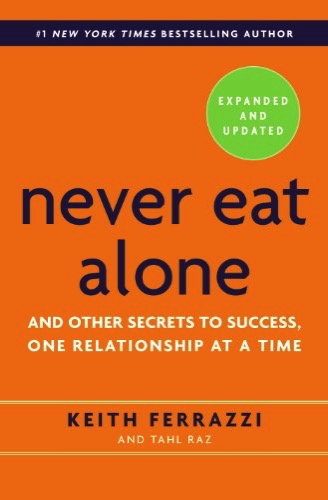Note: For some time I have kept, on index cards, written notes about the books I’ve read. I decided to share some of these thoughts here, and will be posting them, one by one on individual books, in no particular order. I’ll group them all together on a central page later. For now I’m assigning them all to my Book Notes category. Thanks to Derek Sivers for the inspiration.

Never Eat Alone…and Other Secrets to Success, One Relationship at a Time
By Keith Ferrazzi and Tahl Raz
Published: 2005
ISBN: 0385346654
Amazon link
Rating: 6/10
Brief recap: A popular book about the power of networking. I didn’t find it revelatory, but appreciate the central theme, which is common sense: that you should help friends just to help them, not because you expect something in return. In other words, as the author writes, networking can be a huge advantage – but don’t keep score.
My notes:
- Ferrazzi relates his story of growing up in the U.S. in a lower-middle class family, outside of elite circles. One he became friends with influential people, however, he discovered that they helped him in school and work, and that – of course – it’s much better to be on the inside than on the outside looking in.
-
Anyone who’s read books about the power of networking is probably familiar with most of the notions mentioned here. These include: the importance of building relationships with business contacts over the long term; the importance of being kind to assistants and other gatekeepers; why it’s key to follow up after you meet new contacts in order to stay in touch; how to make the most of meeting people at conferences; how to make small talk; etc.
-
My main takeaway from the book, though, was that it reinforced the the importance of trust in building career capital via the relationships you make, over time. As Ferrazzi writes:
My point is this: Relationships are solidified by trust. Institutions are built on it. You gain trust not by asking what people can do for you, to paraphrase an earlier Kennedy, but what you can do for others. In other words, the currency of real networking is not greed but generosity.
Business cycles ebb and flow; your friends and trusted associates remain.
- When it comes to books on the power of networking, I suggest checking out the 1937 Dale Carnegie classic “How to Win Friends and Influence People” (which is not nearly as smarmy as the title suggests).